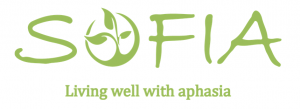The history of the SOFIA project
Listening to people with aphasia as a Speech and Language Therapist
How did I come to be leading the SOFIA project? My story starts in Streatham, South London. This was my second job as a Speech and Language Therapist, and for the first time I was working with people who had had a stroke. I worked in the community and visited people in their homes soon after they left hospital. Their lives were turned upside down and it could feel overwhelming. This led to me starting an MSc and then a PhD exploring what happens to people’s social support networks post stroke and what sort of support really matters to people. It was a humbling experience to be invited into people’s homes and listen to their stories. One theme in particular stayed with me: people told me about how vulnerable they felt, that they felt they were closing in on themselves, becoming withdrawn.
‘You become quite introvert and frightened when you have a stroke, because you realize you’re rather vulnerable’ (click here to read full article)
Following my PhD I began to research what interventions might help people with the psychological impact of having a stroke. It was disheartening to see how little research there was into psychological therapies for people with aphasia. Too often people with aphasia were excluded from stroke research due to their language difficulties.
First small scale-study exploring Solution Focused Brief Therapy
We were therefore delighted to receive a small amount of money from the Research Sustainability Fund, City, University of London, to run a small-scale project exploring Solution Focused Brief Therapy for people with aphasia (click here to read the paper describing the project). This project was great to work on and gave us a chance to start to see how best to adapt Solution Focused Brief Therapy for people with aphasia. I particularly liked the way this therapy approach helped people to notice all that they had achieved. We had promising results: participants liked the approach, felt listened to, and there were encouraging trends in terms of improved mood and participation.
‘I will speak to outsider, to stranger, but earlier I could not… I’m improved now, I’m prepared to speak to strangers.’ (click here to read full article)
Asking people with aphasia for advice
We then secured funding from the Enabling Involvement Fund, part of the Research Design Service, to hold a one-off workshop with people with aphasia to ask them what they thought we should be researching. They said: do research into how to help people with confidence and emotions, especially in the longer term post stroke, and make sure you include people with severe aphasia.

Lady Wolfson, Dr Sarah Northcott, Professor Averil Mansfield CBE, and Professor Sir Mark Walport (credit: Stroke Association)
The birth of SOFIA!
The next step was persuading someone to fund a larger study exploring Solution Focused Brief Therapy. We are very grateful that the Stroke Association are funding the SOFIA project (November 2016 to December 2019). The award was presented to me personally by Professor Averil Mansfield CBE, the first female Professor of Surgery and former Chair of the Stroke Association, at a ceremony in Lancaster House. It was a pleasure to meet Professor Mansfield, and I am honoured that the award is named after her.
So the full title of the project is “Adapted SOlution Focused Brief Therapy In post-stroke Aphasia: a feasibility trial”. That seemed a bit of a mouthful! Katerina, my supervisor, told me the project needed a name. Coming up with a name turned out to be quite tricky: but SOFIA seemed better than SOFA… Still, although the project now had a name, she was still in need of a logo. By chance, the person I sat next to on a training course at Barts Clinical Trials Unit turned out to be the lovely Maria D’Amico, both researcher in maternal health AND a graphic artist. I love the logo she created for us!
First year of the SOFIA project
During the first year of the project we have been busy getting ready for the trial. We have written a project protocol, obtained NHS and university ethical approval, worked with two NHS sites, trained our clinicians and research assistants, and set up a Trial Steering Committee. We also had a series of workshops with our Aphasia Advisory Group so that people with aphasia have been involved in decisions about how best to set up the study. Finally, we ran a small-scale pilot study with people who had very severe aphasia to see if it would be possible to include them in the trial. Their feedback was: yes, people with severe aphasia can benefit from this therapy approach too.
And we are still recruiting…
We are now at the exciting stage of running the feasibility trial. We started recruiting participants in October 2017 and have made a great start. We are still actively looking for further participants. If you, or someone you know, live in the London area, have a stroke and aphasia, and think you might be interested in taking part – let me know!

